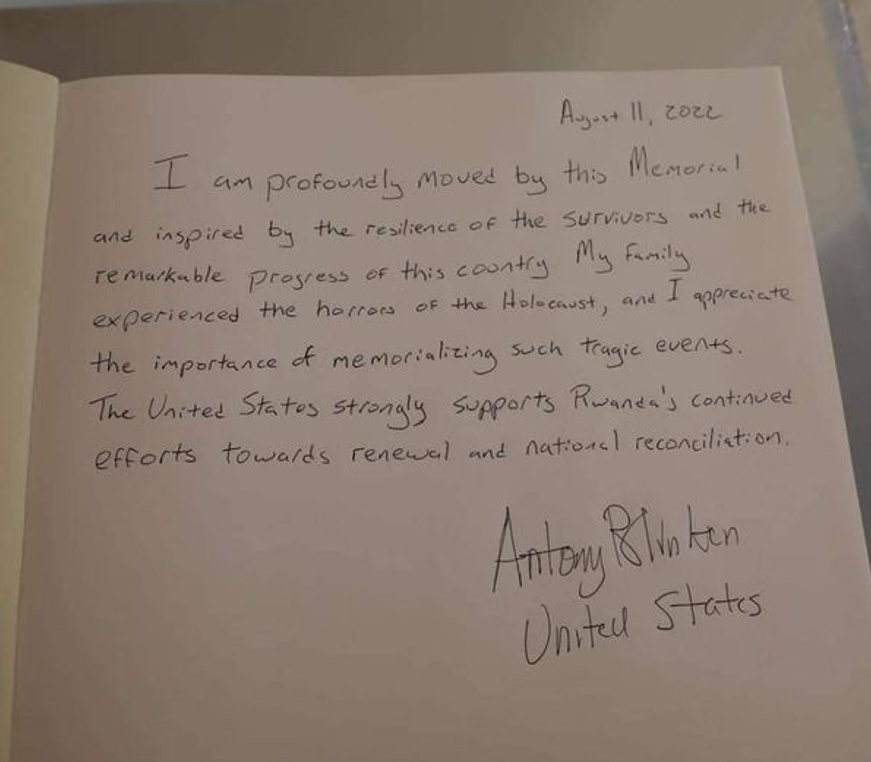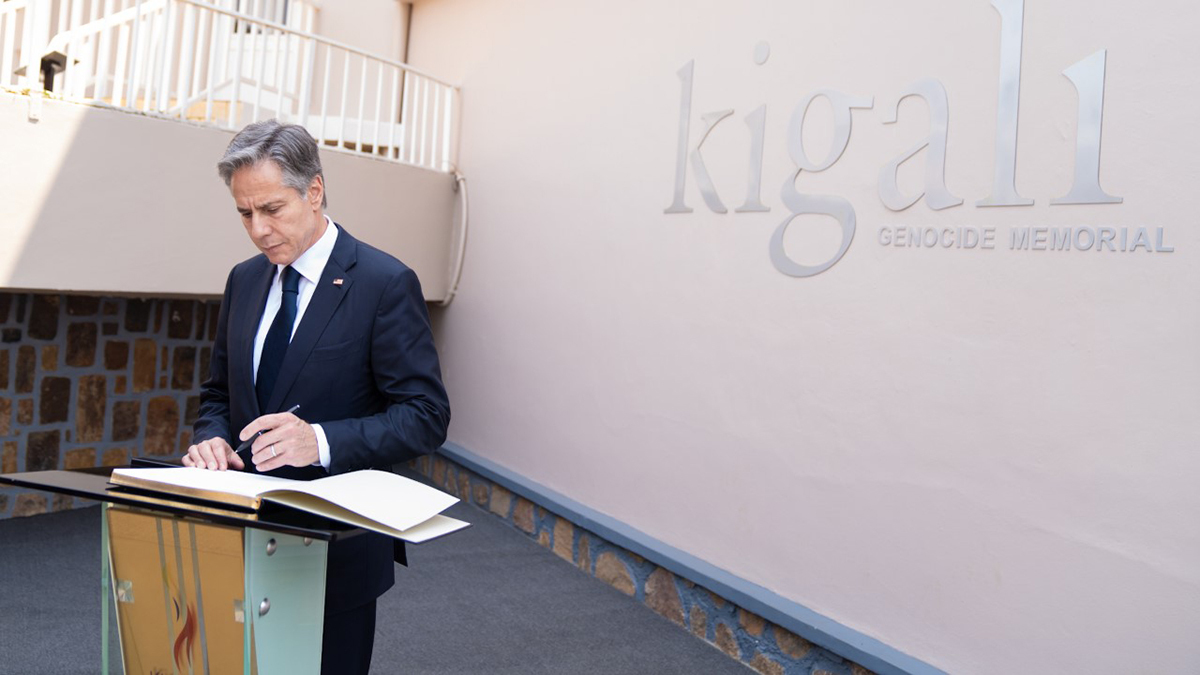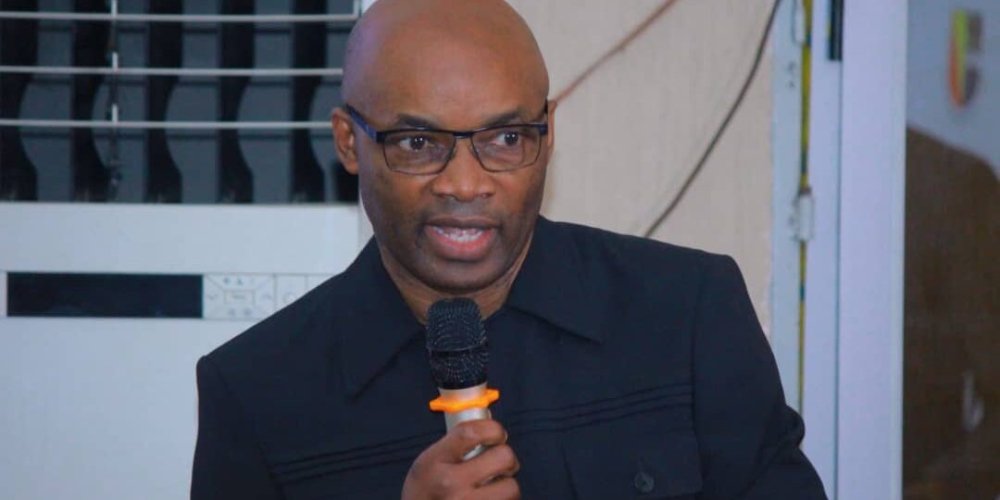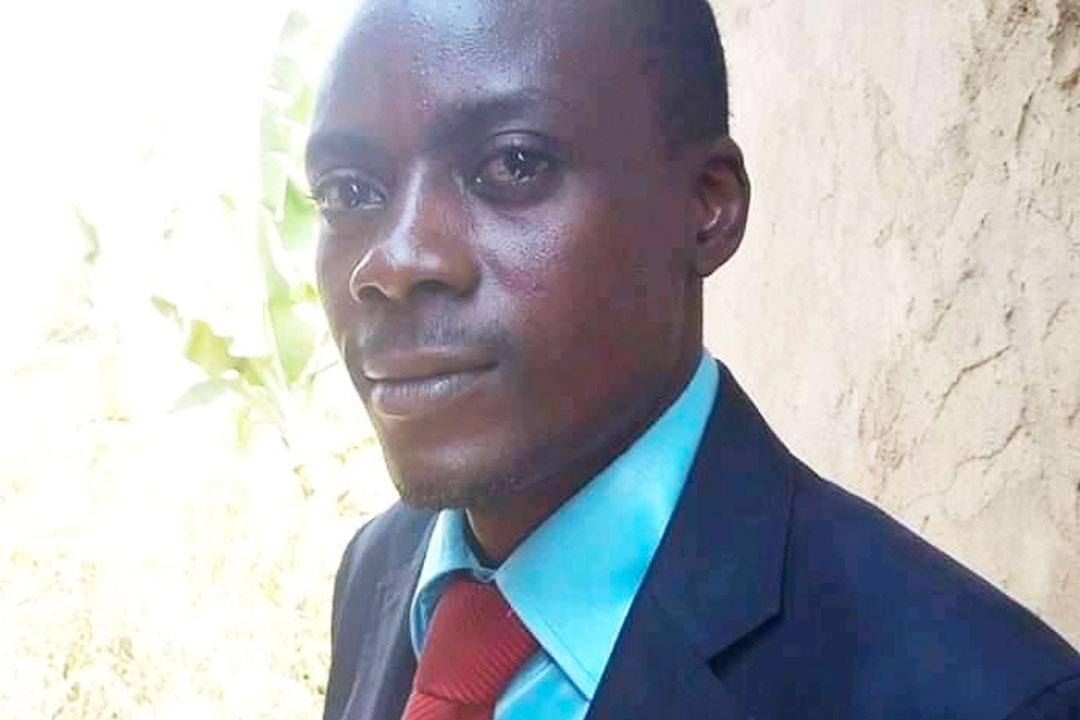Opinion article submitted for publication
On August 10th and 11th, 2022, the United States Secretary of State Antony Blinken was in Kigali for a two-day visit. As per the usual protocol reserved for VIPs, the Rwandan Government took him to the Genocide Memorial in Kigali and invited him to leave a message in the book of condolences. To the surprise of many, Secretary Blinken’s message referred to what happened in Rwanda in spring 1994 as “genocidal violence” rather than merely as “Genocide against Tutsi,” and declared the US was “steadfast” in “support[ing] every Rwandan working towards reconciliation, peace, and prosperity.”
First, let us stress the fact that the Tutsi population of Rwanda has been victim of a genocide, at least between April and July 1994. Hundreds of thousands of innocent humans were killed or hunted because they were Tutsi and with the specific intent to destroy them in whole or in part.
Second, there is no doubt that the US Secretary of State, a Holocaust survivor descendant, is aware of the definition of genocide as stated by Article 2 of the Convention to Prevent and Fight Genocide.[1]
So, why would Antony Blinken, during an official mission as a top-level representative of the US Government, choose to speak about “genocidal violence” in Rwanda, and not about “Genocide against Tutsi” as the Rwandan Government is expecting everyone to do?
The crimes committed against the Hutu
A first answer could be that, even if the wording “Genocide against Tutsi” is factually and legally correct to describe what happened to the Tutsi population in 1994, it does not include what happened to the Hutu population in the same period and the years before and after. Indeed, while many Rwandans were at war and/or committing and or/inciting to commit mass killings, most of the Rwandan population, Tutsi and Hutu, were simply victims.[2]
The message left by Secretary Blinken in the book of condolences at the Genocide Memorial is a subtle but clear reminder that the US has chosen not to ignore the innocent Hutu victims, contrary to many governments and individuals around the world, who have chosen to do so.
Serious and credible reports have documented crimes committed against the Hutu population since the early 90s.[3] Notably, the UN Mapping Report established that Hutu refugees were systematically killed in eastern DRC and that those killings amounted to genocide, especially between 1996 and 1998,[4] after Paul Kagame decided to destroy the Hutu refugees’ camps and to hunt anyone who would not return to Rwanda.[5]

Special investigations by the International Criminal Tribunal for Rwanda (ICTR) have revealed brutal crimes committed against the Hutu population as early as 1993 through 1995 in Rwanda, with a death toll amounting to hundreds of thousands of men, women, children, and elderly. Further testimonies[6] and investigations[7] detailing crimes committed against the Hutu population in 1996 in northern Rwanda are terrifying.
In 2008, a Spanish Judge, Fernando Andreu Merelles, issued international arrest warrants against 40 senior military officers of the RPF for war crimes, crimes against humanity and crime of genocide against the Hutu population.[8] Due to political pressure, the arrest warrants were limited to the Spain territory in 2015[9]
Even though there has not been any trial against the perpetrators, it does not mean the crimes never happened or that survivors and those who were killed are to be ignored. With this in mind, we can understand why Antony Blinken refused to fall into the trap of using a terminology that ignores hundreds of thousands of innocent victims because of their (Hutu) ethnicity.
A way to reconciliation
A second answer to the question why Secretary of State Blinken used the terminology “genocidal violence” can be found in the second part of his message, where he declared that the US remains “steadfast” in supporting “every Rwandan working towards reconciliation, peace, and prosperity,” precisely as if he was calling on the Rwandan Government to recognize all victims as a further step to genuine reconciliation, peace, and prosperity.
In 2021, the Rwandan Government claimed to have reached a 94.6% score on the national reconciliation barometer.[10] When the full report was published, many wondered how it was possible to reach such a high reconciliation score when Hutu survivors were never involved in any reconciliation program.
Referring to “genocidal violence” is a clear message that not only Tutsi were victims and that Hutu victims should be considered henceforth in reconciliation programs. This has nothing to do with denying anything, but rather with suggesting that genuine reconciliation between Rwandans can be achieved if and only if all victims are properly recognized, and all survivors are allowed to rebuild.
Today, it is the Ministry of Unity and Civic Engagement created in July 2021 which is in charge of national reconciliation. Unfortunately, it is headed by a notorious extremist who goes so far as labelling anyone who talks about Hutu victims as a “genocide denier.”[11] The US will have a hard time working with him on this matter, especially since he is the architect of the ideology that is used to harass, and in some cases prosecute, anyone who talks about crimes committed against the Hutu.[12]
One plus one equals two
Finally, another reason why Secretary Blinken might have left such message is because the sensitive debate as to how to properly call the crimes committed against all Rwandans has never found consensus. Unsurprisingly, the ruling party, the RPF, strives to impose a terminology that does not include the crimes it is accused of, i.e., the genocide against the Hutu, whereas others (including apparently Secretary Blinken) seek to include all genocidal crimes committed against Rwandans, no matter who committed them.
RPF masterminds and propagandists have been teaching young Rwandans that whoever talks about another genocide, i.e., that against the Hutu, is a “genocide denier” and an “enemy of the state.” An absurd reasoning, yet one that was translated into a criminal law in 2018, allowing the government to imprison for up to 7 years anyone who advocates for the recognition of the genocide against the Hutu.[13] No one should be jailed for seeking justice for what s/he has been victim of, especially since one genocide plus one genocide equals to two genocides, and not zero genocides.
Secretary Blinken should be safe from any prosecution, as he did not explicitly refer to a second genocide. On the other hand, his referring to “genocidal violence”—implicitly recognizing genocide victims on all sides — is a clear message that the United States remains open to recognition of the existence of two genocides.

No matter how the regime hardliners have reacted so far, Antony Blinken’s message has already generated a new hope among Hutu survivors in Rwanda, as well as throughout the Great Lakes Region and all around the world, where they are struggling to revive and obtain justice.
Patrick Horanimpundu, a Hutu survivor who lives in Belgium, once declared: “We will never lose hope; our pain will be recognized one day.”[14]
After almost three decades of victimhood denial, maybe the day Patrick has been waiting for is finally about to come?
Gustave Mbonyumutwa
Opinion article submitted for publication

[1] https://www.ohchr.org/en/instruments-mechanisms/instruments/convention-prevention-and-punishment-crime-genocide
[2] https://www.jambonews.net/en/actualites/20180212-rwanda-what-crimes-were-committed-against-the-hutus-and-tutsis/
[3] https://www.youtube.com/watch?v=Ms0RM9AjAh0 (video: A mapping of crimes in the book “In Praise of Blood, the crimes of the RPF)
[4] http://www.mapping-report.org/en/executive-summary-legal-classification-of-acts-of-violence/#genocide
[5] https://youtu.be/xP_fAI9k-9M (extract of Paul Kagame’s speech on military operations in DRC in 1996)
[6] See, for example, Testimony by Eric Maniriho, a survivor: https://www.youtube.com/watch?v=qanwws0-1_Q
[7] See, for example, the book “In Praise of Blood: The Crimes of the Rwandan Patriotic Front”, by Judi Rever
[8] https://edition.cnn.com/2008/WORLD/europe/02/06/spain.indictments.rwanda/
[9] https://www.bbc.com/news/world-africa-34477883
[10] https://twitter.com/RwandaUnity/status/1385160461348491265?s=20&t=tqd97DePGthyxY62aIsIww
[11] https://www.jambonews.net/en/actualites/20210907-rwanda-j-d-bizimana-the-extremist-sworn-in-as-minister-of-unity-what-to-expect/
[12] The case of Victoire Ingabire: https://www.amnesty.org/en/documents/AFR47/001/2013/en/
[13] Law no. 59/2018 of 22/8/2018 on the crime of genocide ideology and related crimes
[14] Interview with JamboNews on February 25th, 2019: https://www.youtube.com/watch?v=jj3oPaWkI_g





